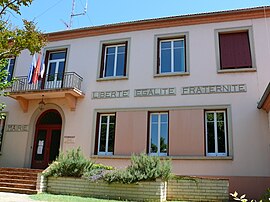world.wikisort.org - France
Saint-Juéry (French pronunciation: [sɛ̃ ʒɥeʁi]; Occitan: Sant Juèri) is a commune in the Tarn department in southern France. It lies adjacent to the east of Albi, the prefecture of Tarn.
Saint-Juéry | |
|---|---|
Commune | |
 The town hall in Saint-Juéry | |
 Coat of arms | |
Location of Saint-Juéry  | |
 Saint-Juéry  Saint-Juéry | |
| Coordinates: 43°56′59″N 2°12′37″E | |
| Country | France |
| Region | Occitania |
| Department | Tarn |
| Arrondissement | Albi |
| Canton | Saint-Juéry |
| Intercommunality | Albigeois |
| Government | |
| • Mayor (2020–2026) | David Donnez[1] |
| Area 1 | 9.21 km2 (3.56 sq mi) |
| Population | 6,694 |
| • Density | 730/km2 (1,900/sq mi) |
| Time zone | UTC+01:00 (CET) |
| • Summer (DST) | UTC+02:00 (CEST) |
| INSEE/Postal code | 81257 /81160 |
| Elevation | 157–332 m (515–1,089 ft) (avg. 174 m or 571 ft) |
| 1 French Land Register data, which excludes lakes, ponds, glaciers > 1 km2 (0.386 sq mi or 247 acres) and river estuaries. | |
Population
| Year | Pop. | ±% p.a. |
|---|---|---|
| 1968 | 5,017 | — |
| 1975 | 5,943 | +2.45% |
| 1982 | 6,738 | +1.81% |
| 1990 | 6,730 | −0.01% |
| 1999 | 6,635 | −0.16% |
| 2007 | 7,041 | +0.75% |
| 2012 | 6,715 | −0.94% |
| 2017 | 6,818 | +0.30% |
| Source: INSEE[3] | ||
Steel industry
The Saut-du-Tarn Steel Works was established by Léon Talabot in Saint-Juéry in 1824 as L. Talabot & Cie.[4] In 1881 a rolling mill hall was built with two mills.[5] In 1882 a coke-fired blast furnace was installed for production of cast iron. The first hydroelectric power station was built in 1898, supplying electricity to the factory and the village.[6] During the period from 1884 to 1934 many peasants came to work in the steel works from Cahuzaguet, Saint-Grégoire, Arthès, les Avalats and Marsal. Many settled in Saint-Juéry, which grew from 1,400 inhabitants in the 19th century to 7,000 inhabitants as of 2015.[7] With the collapse of the iron and steel industry, the factory closed in 1983.[6] As of 2015 there were still steel enterprises in the village of Saint-Juéry that employed over 250 people making hydraulic and oil valves, agricultural tools and speciality steel.[7]
See also
References
- "Répertoire national des élus: les maires". data.gouv.fr, Plateforme ouverte des données publiques françaises (in French). 2 December 2020.
- "Populations légales 2019". The National Institute of Statistics and Economic Studies. 29 December 2021.
- Population en historique depuis 1968, INSEE
- Hauts-Fourneaux, Forges & Aciéries ... industrie.lu.
- Historique – AEDT.
- Patrimoine – Saint-Juéry.
- MF 2015.
Sources
- "Hauts-Fourneaux, Forges & Aciéries du Saut-du-Tarn", industrie.lu (in French), retrieved 2017-09-07
- Historique (in French), AEDT: Aciers et Energies du Tarn, retrieved 2017-09-07
- MF (13 September 2015), "A Saint-Juéry, le Saut du Tarn est encore vivant", La Depeche (in French), retrieved 2017-09-07
- Patrimoine (in French), Saint-Juéry, retrieved 2017-09-07
На других языках
- [en] Saint-Juéry, Tarn
[es] Saint-Juéry (Tarn)
Saint-Juéry es una población y comuna francesa, ubicada en la región de Mediodía-Pirineos, departamento de Tarn, en el distrito de Albi y cantón de Villefranche-d'Albigeois.[ru] Сен-Жюэри (Тарн)
Сен-Жюэри́ (фр. Saint-Juéry, окс. Sant Juèri) — коммуна во Франции, находится в регионе Юг — Пиренеи. Департамент — Тарн. Административный центр кантона Сен-Жюэри. Округ коммуны — Альби.Другой контент может иметь иную лицензию. Перед использованием материалов сайта WikiSort.org внимательно изучите правила лицензирования конкретных элементов наполнения сайта.
WikiSort.org - проект по пересортировке и дополнению контента Википедии